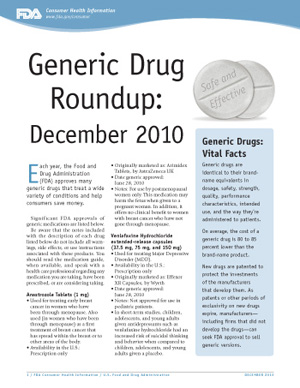Generic Drug Roundup: December 2010
Each year, the Food and Drug Administration (FDA) approves many generic drugs that treat a wide variety of conditions and help consumers save money.
Significant FDA approvals of generic medications are listed below.
Be aware that the notes included with the description of each drug listed below do not include all warnings, side effects, or use instructions associated with these products. You should read the medication guide, when available, and speak with a health care professional regarding any medication you are taking, have been prescribed, or are considering taking.
Anastrozole Tablets (1 mg)
Used for treating early breast cancer in women who have been through menopause. Also used (in women who have been through menopause) as a first treatment of breast cancer that has spread within the breast or to other areas of the body.
Availability in the U.S.: Prescription only
Originally marketed as: Arimidex Tablets, by AstraZeneca UK
Date generic approved: June 28, 2010
Notes: For use by postmenopausal women only. This medication may harm the fetus when given to a pregnant woman. In addition, it offers no clinical benefit to women with breast cancer who have not gone through menopause.
Venlafaxine Hydrochloride extended-release capsules (37.5mg, 75mg, and 150mg)
Used for treating Major Depressive Disorder (MDD).
Availability in the U.S.: Prescription only
Originally marketed as: Effexor XR Capsules, by Wyeth
Date generic approved: June 28, 2010
Notes: Not approved for use in pediatric patients.
In short-term studies, children, adolescents, and young adults given antidepressants such as venlafaxine hydrochloride had an increased risk of suicidal thinking and behavior when compared to children, adolescents, and young adults given a placebo.
Aztreonam (for Injection)
Used for treating a wide variety of bacterial infections. It is an antibiotic that stops the growth of bacteria.
Availability in the U.S.: Prescription only
Originally marketed as: Azactam for Injection, by Bristol Myers Squibb
Date generic approved: July 18, 2010
Notes: This medication should be used only to treat or prevent infections that are proven—or strongly suspected—to be caused by bacteria. Aztreonam may cause antibiotic-associated diarrhea.
Enoxaparin Sodium Injection
Used for multiple purposes, including prevention of deep vein thrombosis, a potentially deadly condition that occurs when a blood clot forms in one of the body’s deep veins, usually in the legs.
Availability in the U.S.: Prescription only
Originally marketed as: Lovenox Injection (Preservative-Free), by Sanofi-Aventis
Date generic approved: July 23, 2010
Notes: Use of this medication in patients undergoing spinal/epidural anesthesia or spinal puncture increases the risk of spinal or epidural bleeding and bruising, which may cause long-term or permanent paralysis.
Losartan Potassium Tablets (25 mg, 50 mg, and 100 mg)
Used to help control high blood pressure, which is also known as hypertension. It is also used to lower the risk of stroke in people who have high blood pressure and a heart condition called left ventricular hypertrophy (enlargement of the walls of the left side of the heart).
Availability in the U.S.: Prescription only
Originally marketed as: Cozaar Tablets, by Merck
Date generic approved: Oct. 6, 2010
Notes: This medication could cause serious side effects. Users should notify a health care professional immediately if they experience difficulty breathing or swallowing, fainting, hoarseness, or swelling of the face, throat, hands, feet, lower legs, ankles, or tongue.
Generic Drugs: Vital Facts
- Generic drugs are identical to their brand-name equivalents in dosage, safety, strength, quality, performance characteristics, intended use, and the way they're administered to patients.
- On average, the cost of a generic drug is 80 to 85 percent lower than the brand-name product.
- New drugs are patented to protect the investments of the manufacturers that develop them. As patents or other periods of exclusivity on new drugs expire, manufacturers—including firms that did not develop the drugs—can seek FDA approval to sell generic versions.
Posted Dec. 20, 2010
Return to FDA Consumer Articles

